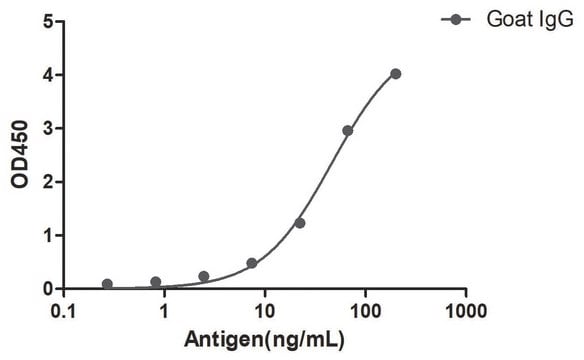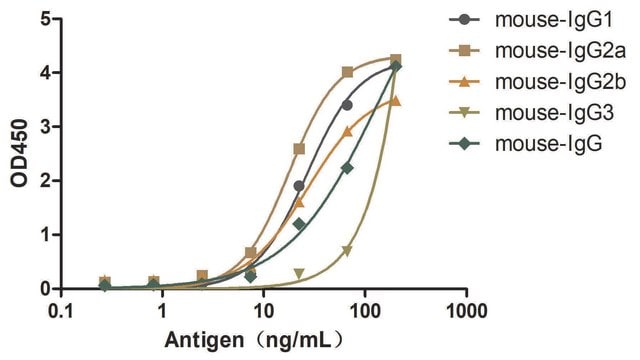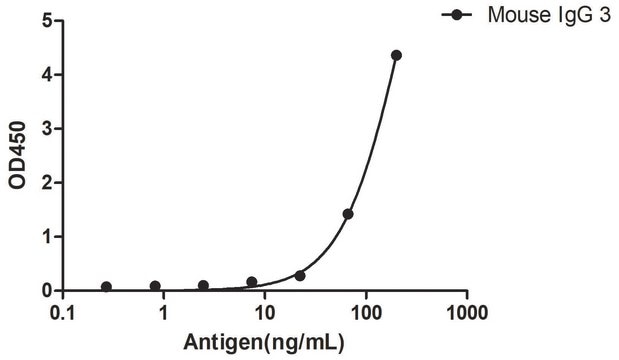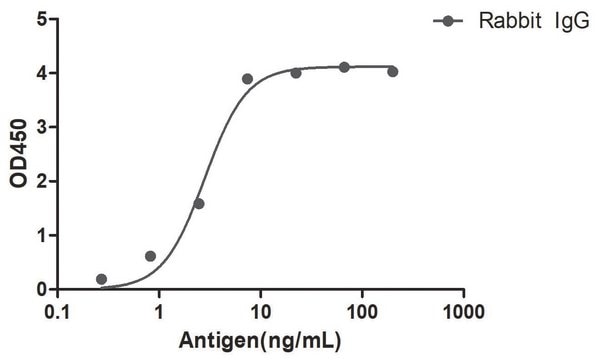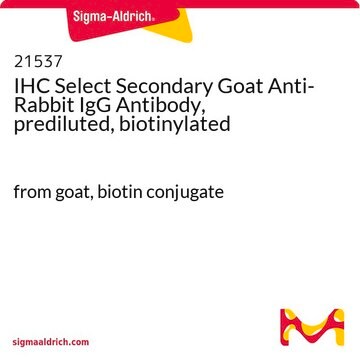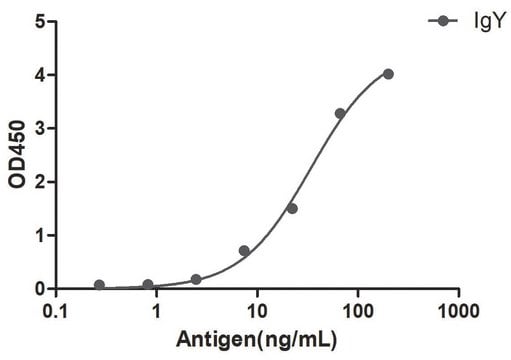SAB5801021
Alpaca Anti-Mouse IgG1(Fcγ) single domain Antibody
recombinant Alpaca(VHH) Nano antibody
Synonim(y):
Recombinant Alpaca single variable domain secondary Nanobody
About This Item
Polecane produkty
pochodzenie biologiczne
alpaca
rekombinowane
expressed in E. coli
białko sprzężone
unconjugated (6*his tag and one cys were added at the C terminal of the VHH)
forma przeciwciała
affinity purified immunoglobulin
rodzaj przeciwciała
secondary antibodies
klon
recombinant monoclonal
Postać
lyophilized solid
masa cząsteczkowa
14 kDa
reaktywność gatunkowa
mouse, Alpaca
metody
ELISA: 1:10000-1:50000
western blot: 1:10000-1:50000
rozmiar
0.1 mL
kolor
colorless
izotyp
VHH
numer dostępu UniProt
Warunki transportu
wet ice
temp. przechowywania
2-8°C
Opis ogólny
Most monoclonal antibodies are generated in mouse. There are five antibody isotypes (IgA, IgD, IgE, IgG, and IgM) from mouse. Each isotype has a different heavy chain. Mouse IgG constitutes 75% of serum immunoglobulins, and IgG is the predominant form of first antibody produced from mouse. Mouse IgG consists of five subclasses-IgG1, IgG2a, IgG2b, IgG2c(inbred mouse strains with the Igh1-b allele have IgG2c isotype instead of IgG2a), IgG3. They are highly homologous and differ mainly in the hinge region. The whole IgG molecule possesses both the Fc region and the Fab region, which possessing the epitope-recognition site. The IgG contains two heavy and light chains, and the heavy chain is about 50 KD and the light chain is about 25 KD. The common IgG is monomeric with a molecular weight of approximately 150 kD.
VHH are single-domain antibodies derived from the variable regions of heavy chain of Camelidae immunoglobulin. The size of VHH is extremely small (less than 15KDa) compared to other forms of antibody fragment, which significantly increase the permeability of VHH. Thus VHH is considered of great value for research, diagnostics and therapeutics.
Specyficzność
Isotype: VHH domain of alpaca IgG2b/2c
Immunogen
Opakowanie
Postać fizyczna
Rekonstytucja
Przechowywanie i stabilność
Inne uwagi
Nie możesz znaleźć właściwego produktu?
Wypróbuj nasz Narzędzie selektora produktów.
Hasło ostrzegawcze
Warning
Zwroty wskazujące rodzaj zagrożenia
Zwroty wskazujące środki ostrożności
Klasyfikacja zagrożeń
Aquatic Chronic 3 - Skin Sens. 1
Kod klasy składowania
13 - Non Combustible Solids
Klasa zagrożenia wodnego (WGK)
WGK 3
Temperatura zapłonu (°F)
Not applicable
Temperatura zapłonu (°C)
Not applicable
Certyfikaty analizy (CoA)
Poszukaj Certyfikaty analizy (CoA), wpisując numer partii/serii produktów. Numery serii i partii można znaleźć na etykiecie produktu po słowach „seria” lub „partia”.
Masz już ten produkt?
Dokumenty związane z niedawno zakupionymi produktami zostały zamieszczone w Bibliotece dokumentów.
Nasz zespół naukowców ma doświadczenie we wszystkich obszarach badań, w tym w naukach przyrodniczych, materiałoznawstwie, syntezie chemicznej, chromatografii, analityce i wielu innych dziedzinach.
Skontaktuj się z zespołem ds. pomocy technicznej